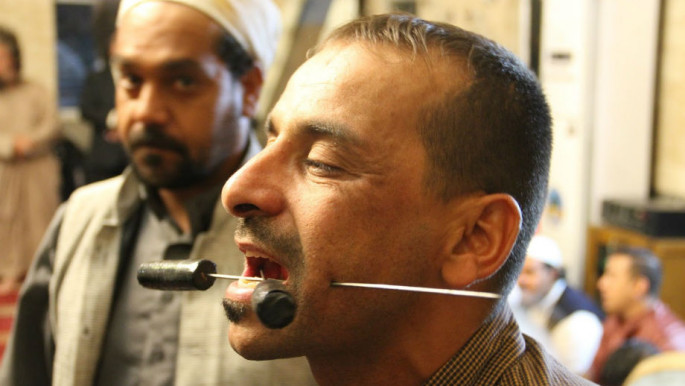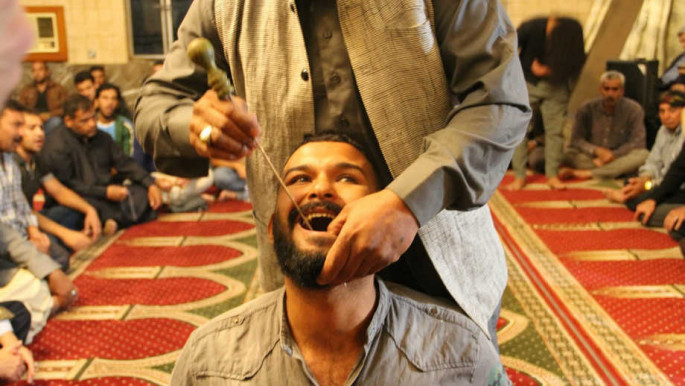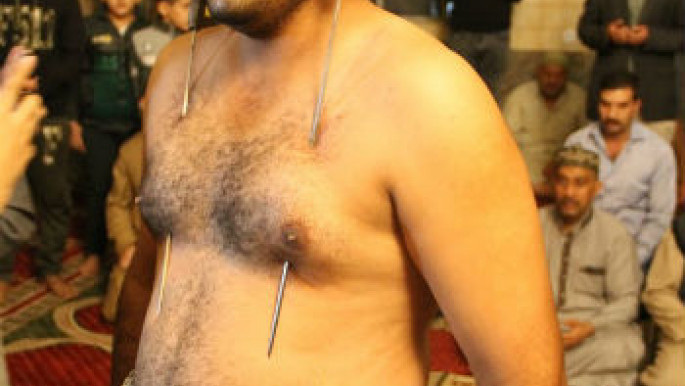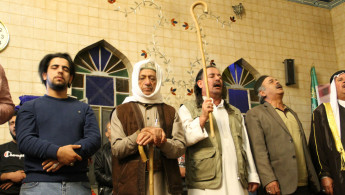Meet the Kasnazani, the Sufi order that practices life-endangering rituals
Abd al Salam speaks calmly, with a playful smile during our interview in the Kasnazani Taqya in Baghdad.
"I didn't do any exercises to prepare for this ritual. I simply follow the creed of our order and that gets me ready for it," he says.
Half an hour earlier, Abd al Salam crushed the glass of a neon tube with his teeth before swallowing it all, along with the liquid chemical mixture, which includes mercury, inside the lamp.
"I just read from our codex and reproduced the deeds. I am not afraid," he says. "The first time was a bit painful, but now I'm used to it; I've done this for twenty years."
Abd al Salam is a member of the Kasnazani order, a sub-order of the Qadiriyeh branch of Sufi Islam that dates back almost one thousand years with a chain of transmission, they say, that traces all the way back to the Prophet Muhammad.
Members of the Kasnazani gather twice a week here in Iraq's capital to practice their traditional rituals. In the Taqiya, the Sufi mosque, the men engage in repetitive chants after performing a more conventional prayer. They then begin the Dhikr: a chant in which they recite all the names of Allah (there are 99) several times.
With their eyes closed and their heads rocking back and forth, they enter a form of trance. Little by little, the pace of words accelerates. At one point, their songs are accompanied by drums. Members of the congregation start moving at different speed while seemingly entering a mystical stage.
Some are absorbed in their thoughts and barely move, while others enter a more hectic phase, swinging back and forth or in circles, shouting the sacred words in honour of their God and its prophet.
The ceremony, surreal to outsiders, eventually enters the final and most incredible phase in which some celebrants take turns to pierce their bodies with spikes. One pushes the sharpened tool through his cheeks, a second one through the tongue, with the spike perforating his throat and coming out under his jaw, through the flesh.
 |
| A devotee pushes spikes through his cheeks [Sylvain Mercadier] |
Another puts two more through his chest. The supervisor of the activities, Ali Abu Sara, finally sticks a spike deep into the socket of his eye, the whole socket turning red. One of the drummers then approaches and hammers two knives into his skull, where they remain in place.
After removing their tools, the men engage with the others in the singing as if nothing had happened.
'Proving the existence of God'
Sufi brotherhoods are common in the Muslim world. But few go as far as the Kasnazani order in terms of perilous practices. Why would men perform such perilous rituals?
 |
| This Kasnazani order member pushed a spike through his tongue [Sylvain Mercadier] |
"These deeds are staged to prove the omnipotence of God, of his Baraka, to those who doubt it. The Baraka refers to the spiritual force or divine gift given to some men to perform supernatural deeds," says Dr Redha, instructor and professor at the Al Salam College in Baghdad.
"Any normal person cannot do these things without seriously endangering his life. They are among the proofs that God allows to be exposed on earth in order to convince the dubious that He is real."
Founded in Baghdad by Abd el-Kadr Gilani (b.1077AD), the community is unusual in many ways. Perhaps the second-most striking fact about this order is that it comprises both Shia and Sunni Muslims.
"Our practices as a Sufi order are not opposed to the principles of the Sunni madhaheb [jurisprudences of Islam]. We all turn towards the same God. The Same with Shia Islam; we admire Ali and Hussein for their sacrifices," says Abd el Salam, who is originally from the Sabean community, but converted to Islam and quickly entered the Sufi order.
"I found the truth in Islam and I found a religion of peace and respect," he adds. Hassan al Jabiri, a Sufi imam present at the gathering goes further in his claims: "There is no Iraqi unity without Sufism. Look around: Sunni and Shia praying their God together... The Qadiriyeh is the true path of God because it draws people together."
 |
| The tip of this spike being pushed into the floor of the mouth is coming out behind the lower jaw [Sylvain Mercadier] |
Under threat
Despite what it calls a universal and peaceful message, the Sufi order has been subject to discrimination, particularly in the past year.
"We were not threatened that much during Saddam Hussein's rule, but the development of radical Islam in the last years has been devastating. The American invasion brought political turmoil and stoked radicalism," says Nuri Jasem, a researcher at the World Center for Sufism and Spiritual Studies of the Kisnazani order.
"In 2006, a car bomb destroyed one of our Taqiya during a ceremony. Many of our members were also kidnapped and murdered. We estimate that no fewer than 3,000 Qadiriyeh members were assassinated - because of their beliefs - in the past fifteen years. The most notorious assassination was perhaps that of Abd el Karim Salman, who led the Qadiriyeh in Mosul.
"Islamic State group members kidnapped him in 2014 and tortured him for a year before executing him, ordering him to disown his Sufi principles, which he never relinquished, which led to his death."
 |
| The extreme nature of the ritual is designed to prove the existence of God [Sylvain Mercadier] |
Although the goal of their "supernatural" rituals is to prove God's existence, it can also sometimes have a counter-productive effect. Many who watch videos of the Kasnazani rituals on social media react negatively - either expressing disgust or superstitiously believing that Sufis were resorting to "black magic" in performing these feats.
But despite these threats and misunderstandings, the members of the Kasnazani are confident that their message will be better understood in the future.
"I want to ask all people to follow the path of Allah they feel is right inside them, because it will make them real humans. They have to praise Allah, worship him in order to become Darwishes. Darwishes are the wise and trained Sufis better inclined to perform good deeds in the communities.
"The Qadiriyeh is not just about stabbing [oneself]. It's something higher and holier than that. A true darwish makes no distinction between humans or religions."
Sylvain Mercadier is a freelance journalist. Follow him on Twitter: @Sylv_Mercadier
Editor's note: This article was updated on November 29, 2018, to clarify that the Kasnazani is a sub-order of the Qadiriyeh order. The rituals described above are not practiced by the wider order at large.



